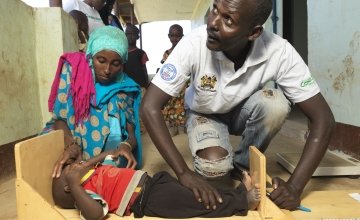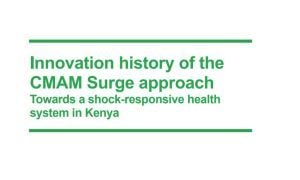
Read our 2024 annual report

Knowledge Hub
Emergency Nutrition Response Project for Drought Affected Communities in Marsabit County, Kenya - Final Evaluation 2019
This evaluation report concerns the USAID (OFDA) funded Emergency Nutrition Response Project for Drought Affected Communities in Marsabit County, Kenya. The project aimed to address the heightened nutrition and health needs of the vulnerable populations of Marsabit County as a result of the 2016/2017 drought emergency as well as strengthen community and facility level nutrition services and hygiene promotion.

The programme also aimed to strengthen the County and Sub-Counties’ capacity to coordinate nutrition services during the drought emergency. The overall project goal was to contribute to reduction in morbidity and mortality by timely identification and appropriate management of acutely malnourished children (6-59 months) and pregnant and lactating women (PLW) affected by the drought. The project sought to achieve this goal by pursuing the following two strategic objectives (SOs):
- To rehabilitate those with acute malnutrition and promote appropriate key nutrition practices through implementation of high impact nutrition interventions at health facilities, outreach sites and community level.
- To promote adoption of appropriate hygiene behavior to ensure improved nutrition in children under age of five and PLWs
The sub-sectors of the response included the following: Infant and Young Child Feeding and Behavior Change; Management of Moderate Acute Malnutrition (MAM) and Management of Severe Acute Malnutrition (SAM); Nutrition Systems and Hygiene Promotion.
The overall purpose of the evaluation was to assess the relevance, effectiveness, efficiency, impact and sustainability of the OFDA funded emergency response project. Alongside this purpose, the consultant also documented key lessons learnt and provided technical recommendations that could be used to improve future programming.
Findings
In terms of relevance, the evaluation established that the project was designed to address the heightened nutrition and health needs of the vulnerable populations of Marsabit County due to the drought emergency. In assessing the extent to which the project interventions aligned with both county and national government as well as Concern strategic priorities the evaluation established that the Project design was aligned to Concern Worldwide and government strategic priorities as well as community priority needs. The Project responded to Marsabit County Integrated Development Plan (CIDP) Health and Nutrition priorities, including the following Integrated Management of Acute Malnutrition (IMAM) scaled up, training and equipping health workers with skills to deliver quality nutritional services as well as IMAM surge roll out and scale up to health facilities. The project outcomes, outputs and activities were in line with Concern Strategic objectives.
In determining the project effectiveness, the evaluation examined the extent to which the objectives of the project interventions have been realized. The evaluation found that nutrition outreach services as well as provision of non-food items (NFIs), led to increased access to health and nutrition services including timely management of SAM and MAM and referrals. The evaluation found an improvement in global acute malnutrition (GAM) rates from 16.7% in 2017 to 12.4% in 2018 which is attributed to, among other interventions, the strengthening of level one health system through training of community health volunteers (CHVs) on maternal, infant and young child nutrition (MIYCN) as well as sensitisation of caregivers, expanded access and delivery of quality services. The project enhanced the technical capacity of health workers by training 94 health care workser on IMAM and facilitated the Ministry of Health to conduct routine mentorship of the health workers guided by the nutrition gaps assessment. These mentorship and trainings have contributed to better nutrition outcomes, including the cure rate of >75%.
In assessing efficiency, the evaluation established that project adopted a seamless coordination mechanism which was aligned to government and other agency modus operandi. The project participated in monthly County Steering Group (CSG) meetings chaired by Governor as well as Sub County and County nutrition technical fora (SCNTF) which were held monthly. Through this project County multi-sectoral coordination forum for nutrition comprising 6 departments and partners was established. This led to better coordinated response minimizing drought impact in the lives on children and pregnant and lactating women. The project operations were guided by Concern financial management and procurement procedures and standards which included competitive bid analysis for various services.
Impact: In assessing the key results of the project interventions in terms of nutrition, health and sanitation elements, the evaluation determined that there was improvement in nutrition situation in Marsabit County within the project period as a result of the project interventions alongside other intervening factors such as the rains that were witnessed in the month of April to May 2018. The project also resulted in improvements in WASH practices as well as health seeking behavior such as improved ANC and skilled delivery.
In assessing sustainability, the evaluation established that the project design focused on long term elements which are expected to yield changes that will outlive the project. For instance, the emphasis on capacity strengthening of the health system, particularly the government supported community health strategy is likely to yield long term impact.
Due to security reasons, and the sensitive nature of the evaluation report, the full report cannot be made publicly available.
This publication is made possible by the generous support of the American people through the United States Agency for International Development (USAID) Office of US Foreign Disaster Assistance (OFDA). The contents are the responsibility of Concern Worldwide and do not necessarily reflect the views of OFDA, USAID or the United States Government.




